 MyCatBreeds
MyCatBreeds Turkish Van is originated from Turkey but British Shorthair is originated from United Kingdom. Both Turkish Van and British Shorthair are having almost same weight. Turkish Van may live 5 years less than British Shorthair. Both Turkish Van and British Shorthair has same litter size. Both Turkish Van and British Shorthair requires Low maintenance.
Turkish Van is originated from Turkey but British Shorthair is originated from United Kingdom. Both Turkish Van and British Shorthair are having almost same weight. Turkish Van may live 5 years less than British Shorthair. Both Turkish Van and British Shorthair has same litter size. Both Turkish Van and British Shorthair requires Low maintenance.
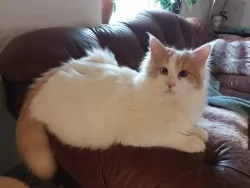 Hailing from Turkey, the Turkish Van was brought to the UK in 1955 by 2 British women, Laura Lushington and Sonia Halliday.
Hailing from Turkey, the Turkish Van was brought to the UK in 1955 by 2 British women, Laura Lushington and Sonia Halliday.
These cats were used as the foundation stock of the breed. They were brought to the United States in 1982 and accepted into championship with the Cat Fanciers’ Association in 1994.
They are a very rare breed and no other breed is allowed to be mixed into the cat's breeding schedule. All registered Turkish Van cats can have their ancestry traced back to the imported cats of Laura Lushington.
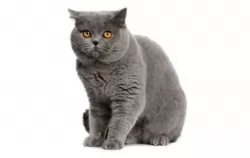 A cat breeder, Harrison Wier took a street cat of Britain and with an intensive breeding program, transformed it to the British Shorthair.
A cat breeder, Harrison Wier took a street cat of Britain and with an intensive breeding program, transformed it to the British Shorthair.
The British loved this beautiful pedigree cat. During the Second World War, the British Shorthair all but disappeared but re-emerged as a popular cat that is today accepted in cat registries around the world.
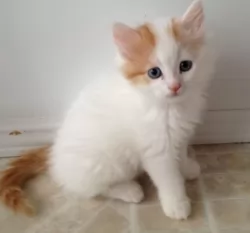 This is a medium to large-sized cat weighing roughly 3 to 8kg. It’s a semi-long-haired domestic cat breed that was actually developed in the United Kingdom with a selection of cats from Turkey.
This is a medium to large-sized cat weighing roughly 3 to 8kg. It’s a semi-long-haired domestic cat breed that was actually developed in the United Kingdom with a selection of cats from Turkey.
The breed is distinguished by the Van pattern where the color is restricted to the head and tail. So the cat is white with color on the head and the tail. The Turkish Van has no undercoat and the cat has a sleek appearance.
The cat is quite long and its back legs are slightly longer than its front legs. The paws are large and they are strong jumpers.
These cats are playful, active, and independent and they are also excellent hunters. They are affectionate and form strong bonds with their human families.
They get on well with kids as well as with other pets. Energetic and agile, they love to leap up onto high places. For a cat, they also have this fascination with water and may well follow their human into a swimming pool or lake.
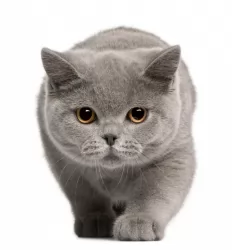 The British Shorthair is a medium to large-sized cat and he can be anything from 5 to 9kg. He has a short to medium-length dense coat that can either be a solid color, bi-color tortoiseshell or patterned.
The British Shorthair is a medium to large-sized cat and he can be anything from 5 to 9kg. He has a short to medium-length dense coat that can either be a solid color, bi-color tortoiseshell or patterned.
The coat becomes thicker and longer in the winter. This is a robust, strong cat, being heavily muscled with heavy bones. The cat also has a broad chest with thick, strong legs. The ears are fairly small and the round eyes give him a totally amicable expression on his face.
The British Shorthair is an amicable cat and makes a superb companion as it's an easy-going cat that adores his human family, being loyal towards them.
The British Shorthair is an active cat and it is able to get by on his own for a few hours without human company. If you do work particularly long hours and you go out a lot, it will be kind to perhaps get another cat for him as a friend.
He is quiet and undemanding and because he is big and heavy he doesn’t like being carried around.
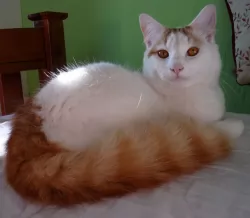 Lively, social, and intelligent, the Turkish Van is going to make you a wonderful pet and companion.
Lively, social, and intelligent, the Turkish Van is going to make you a wonderful pet and companion.
He is an active cat and will require you to play with him and provide some form of exercise for him.
He likes to leap up onto perches so getting him a climbing tree will serve him well as he is a cat that loves perching on high up places.
These cats are also low maintenance which simply adds to them being such perfect pets for single people, couples, families and seniors, just so long as he is provided with lots of love and care.
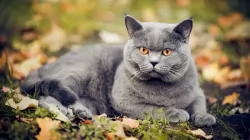 The British Shorthair is such a companionable cat, being intelligent and affectionate, even though he isn’t a lapcat as such.
The British Shorthair is such a companionable cat, being intelligent and affectionate, even though he isn’t a lapcat as such.
That doesn’t mean he doesn’t love being around his human companions. He does and is loyal to them.
They’re laid back cats and are capable of getting on well with children in the home as well as with other pets. He just loves lazing around in the sun and can spend a few hours on his own without feeling anxious or lonely.
These cats are really great companions and they make themselves at home in different lifestyles, whether you live in the countryside or in town and whether you are single, a couple or a family with children and other pets.
Easy to care for, the British Shorthair cat is guaranteed to make you an excellent companion.
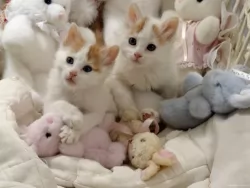 Your Turkish Van counts on you to ensure his health and wellbeing. This will ensure he lives a long and healthy life.
Your Turkish Van counts on you to ensure his health and wellbeing. This will ensure he lives a long and healthy life.
Obesity is a major disease that contributes to many illnesses in cats. Excess weight is one of the factors for the development of arthritis and diabetes as well as some life-threatening diseases.
All kinds of parasites can invade your Turkish Van’s body. . Many types of parasites can be detected with a fecal exam, so a trip to your vet may be necessary.
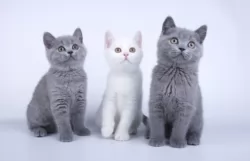 These beautiful cats are a robust, healthy type of cat breed and if you care well for him, you aren’t going to be taking him along to the vet too often. He can also live to be up to 20 years of age.
These beautiful cats are a robust, healthy type of cat breed and if you care well for him, you aren’t going to be taking him along to the vet too often. He can also live to be up to 20 years of age.
This cat has been bred with Persians in the past, so this should alert you to some of the diseases that this particular cat breed is susceptible to. It makes the cat a little bit vulnerable to polycystic kidney, an inherited condition in cats that causes cysts to form in the kidneys. They are small at first but they can grow bigger and actually result in kidney failure.
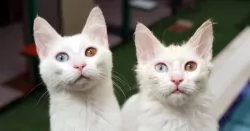 One of the most important things with a cat is diet. The cat is a carnivore. Watch his diet, and make sure he gets plenty of meaty food.
One of the most important things with a cat is diet. The cat is a carnivore. Watch his diet, and make sure he gets plenty of meaty food.
Check with your vet if you aren’t sure how to feed your cat. There must always be a constant supply of fresh, cool water available and both food and water bowls must be washed regularly.
Regularly brush your cat’s coat gently and at the same time check the body over for any unusual lumps. If you discover a new lump, get your cat to the vet.
Be sure to schedule in your cat’s vaccinations as without these your cat can die from some of the more dangerous ones.
Another wise move, if at all possible, is to sign up for pet health insurance as then you won’t dread it financially when your vet requests medical tests be done on your cat.
There are simple things you can do to ensure the longevity of your beloved cat. Good food, exercise, fresh water, and plenty of love and attention.
Turkish Vans can have problems with their teeth. Teeth brushing can be massively traumatic and uncomfortable for your pet, but the best diet and vet care will ensure healthy teeth.
Cats are meticulous about hygiene so ensure the litter box is kept clean. Remove the cat’s feces every single day.
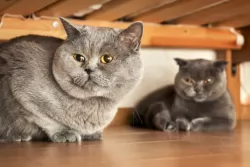 The British Shorthair is a fairly large, robust cat but that certainly doesn’t mean he must be fat. Being overweight can bring about a range of health issues and you want to follow an appropriate diet for him ad see that he gets enough exercise.
The British Shorthair is a fairly large, robust cat but that certainly doesn’t mean he must be fat. Being overweight can bring about a range of health issues and you want to follow an appropriate diet for him ad see that he gets enough exercise.
When it comes to feeding your British Shorthair, always look out for the very best, most nutritious food there is as he is a big cat.
You want to ensure your pet gets enough protein as cats are carnivores - they’re meat eaters and they require chicken, beef and fish. You can give your cat some cooked egg as they are an excellent source of protein.
Be very careful not to be tempted to give your cat chocolates, grapes, nuts, onions or garlic as foods like this are toxic for your cat and can cause him pain and discomfort.
Remember to ensure that there is always a constant supply of fresh, cool water for your cat. If you’re wondering what to feed your cat or you have any other concerns, don’t hesitate to speak to your vet.
Brush your British Shorthair when he starts to shed his winter coat and trim the nails.
Do things for your cat that you would do for your own human child. This is your beloved fur-child and you want him to be happy and healthy.
Check inside his mouth to make sure there aren’t any loose or blackened teeth that could be causing him terrible pain. Also, check inside his ears for signs of redness.
Your British Shorthair is an elegant, clean type of cat so you want to keep his litterbox nice and clean for him.